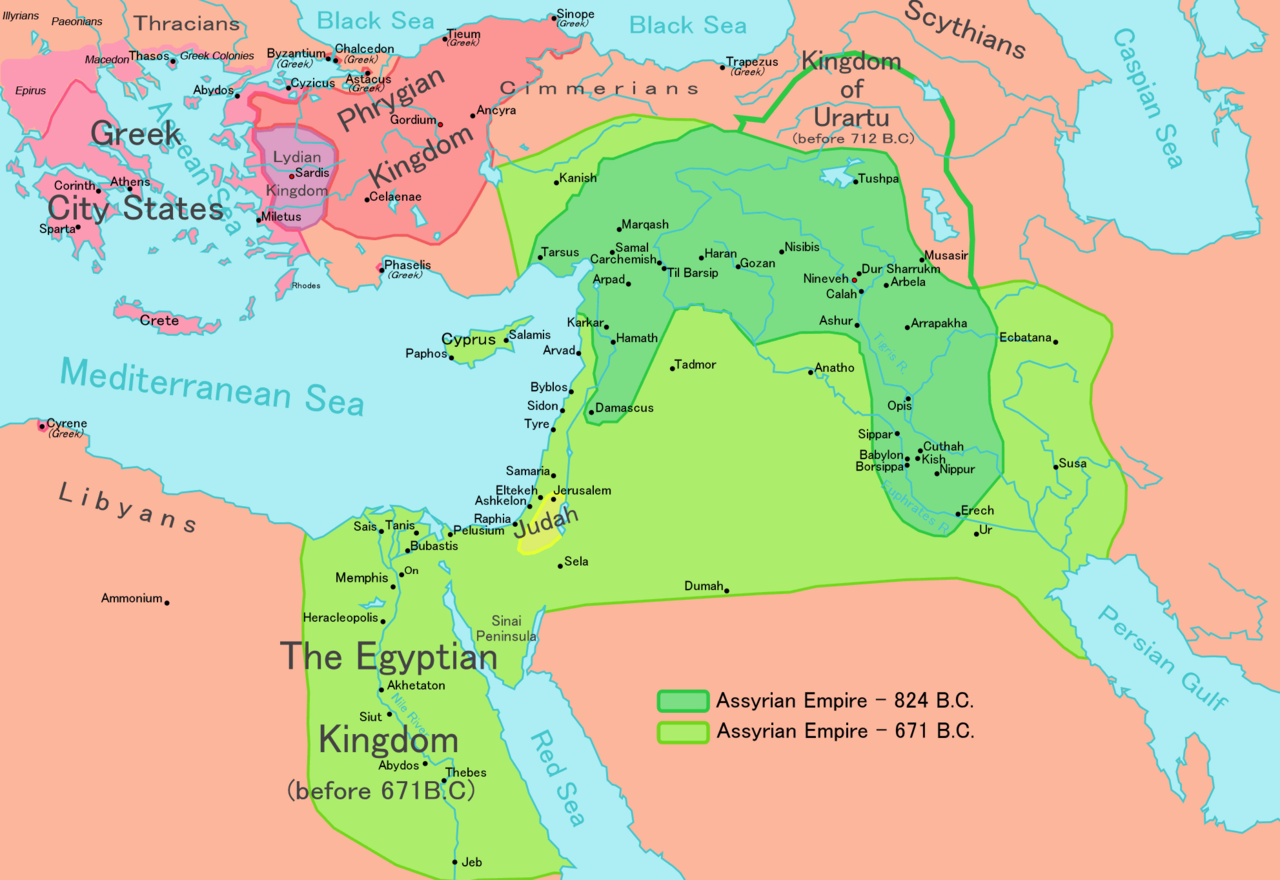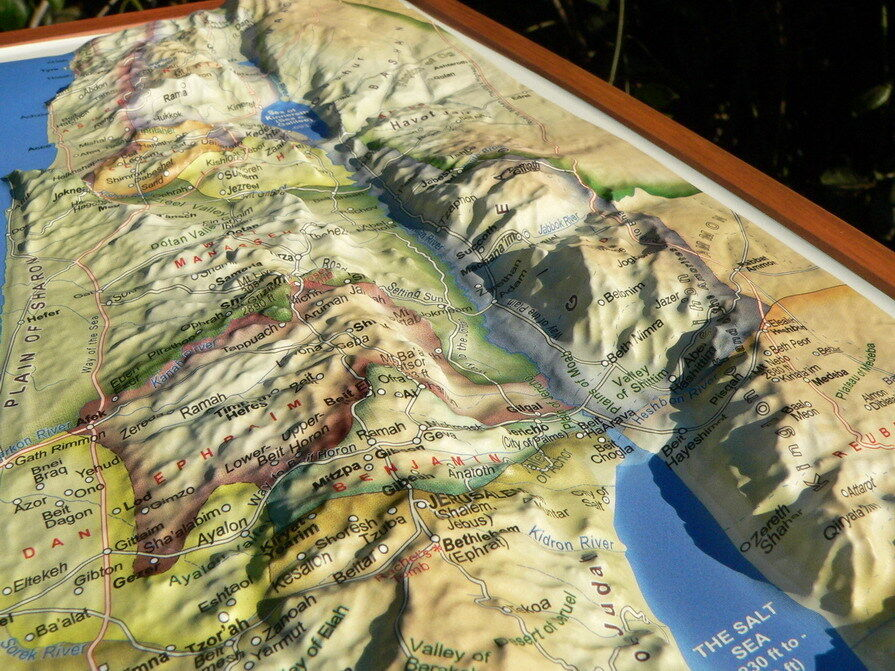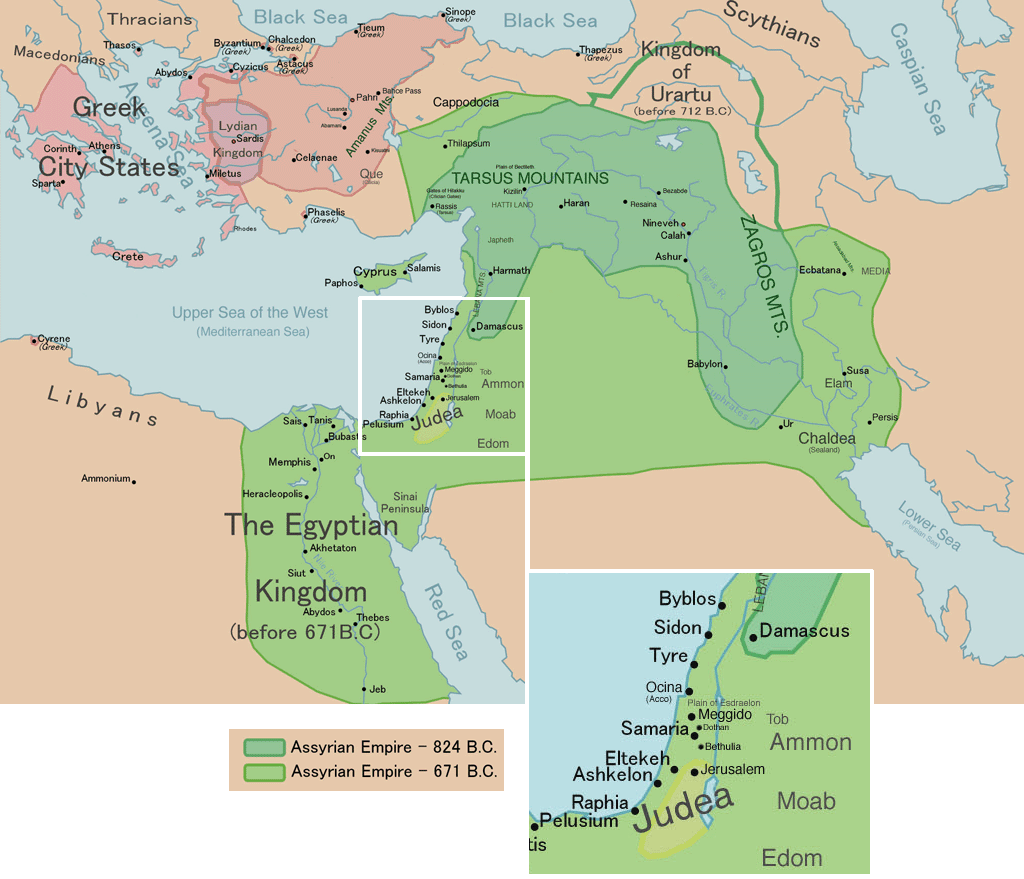Week 1: Judith
Week 1: Judith
Objective:
-
Historical Context of the Story of Judith
- Fasting and Prayer Conquers
Resources:
Fr Luka Maher Series:
- https://www.youtube.com/watch?v=MntHAjn2KqE (Ch 1-4 Intro and Holofernes' Conquest)
- https://www.youtube.com/watch?v=5sDm5SPI3TQ (Ch 5-7 The siege of Israel)
- https://www.youtube.com/watch?v=AN1VkEVGMoc (Ch 8-9 - Judith's Prayer and Plan)
- https://www.youtube.com/watch?v=EIrJsuX6wa0 (Ch 10-11 - Judith Meets Holofernes)
- https://www.youtube.com/watch?v=QFVbd11qSAA (Ch 11-13 - Judith Defeats Holofernes)
- https://www.youtube.com/watch?v=B1H68G342jY (Ch 14-16 - Judith's Final Praise)
Body:
Historical Context: The Assyrian Captivity
- 2 Kings 17
- Shalmaneser, King of Assyria wanted to take conquest over Israel. Coming in from the north, he defeats the Kingdom of Israel, who had had only evil kings; and at present time had an evil king (Hoshea)
- 2 Kings 19
- Sennacherib, successor of Shalmaneser attempts to take Judah (Southern Kingdom) captive, but he fails
- Judah had a righteous king, King Hezekiah and the prophet Isaiah. They prayed that the Lord deliver them from Sennacherib and the Assyrians and the Lord swiftly answered, sending an angel to protect them. The angel of the Lord went out and killed 185,000 of the Assyrian armies in one night.
- So Sennacherib went home to Nineveh, the capital of Assyria, and stayed there the rest of his life.
- Two of his sons killed him while he was praying to his idols. His third son, Esarhaddon reigned in his place as king of Assyria
- 2 Chronicles 33
- Esarhaddon, wanting to avenge his father, sends troops to Judah to attempt to take it into captivity again.
- This time, Judah has an evil king - Manasseh
- Manasseh restored the high places of the idols
- Manasseh practiced witchcraft, soothsaying, sorcery and consulting mediums
- Manasseh raised up altars for Baal
- Manasseh performed child sacrifices
- Will God defend them with an angel now? Certainly not.
- Manasseh is taken into captivity and taken as a slave
- It is worth noting that Manasseh will repent during his captivity and the Lord will bring him back
- But during the time before he repents, while he is in captivity, Judah is left without a king, and is surrounded by the Assyrian army. And this is where the story of Judith takes place
Holofernes' Conquest & The Siege of Israel
- Judith 1
- Arphaxad, king of the Medes built a very powerful city called Ecbatana - this is the early days of the Persian empire.
- Nebuchadnezzar, king of the Assyrians, who reigned in Nineveh the great city, fought against Arphaxad and prevailed over him
- Nebuchadnezzar is not a name, but is a title - and it was used in the Assyrian kingdoms, as well as the Babylonian kingdoms. This is not the same Nebuchadnezzar from the days of Daniel, as that is the Babylonian captivity. But this is Esarhaddon, the son of Sennacherib. He is the one who moved the Assyrian capital to Nineveh.
- Nebuchadnezzar was exalted by this victory and decided to continue his conquest. So he pursued Cilicia, Damascus, Lebanon, Carmel, Kedar, Samaria, Galilee and Jerusalem, and even down to Ethiopia
- Nebuchadnezzar sent a letter to all of those places, but they all responded with rejection. So he gathered his army.
- Judith 2-3
- Nebuchadnezzar sends Holofernes to the nations of the west and he takes most of them, including Idumea (Edom) south of Judah
- They say "it is better for us to live in service to Nebuchadnezzar, the great king, and to become subject to you, rather than to die, even though we may have to suffer our condemnation into the annihilation of slavery." (3:2)
- Judith 4
- You will notice that it is the priest who is managing the resistance and the army here - because there is no king! Manasseh has been taken away
- Judah plans resists the Holofernes and his army
- They gather warriors in the mountains
- The region of Israel and Judah is very mountainous, so they are protected by the mountains. If someone is trying to invade Jerusalem, for example, they will always be coming in from lower ground - so whoever has the higher ground has the advantage.
- They didn't necessarily need to depend on an army or weapons because they had the mountains defending them. This will be important later.
- Judith 5-6
- Holofernes finds out that Judah plans to resist, so he requests the leaders of Moab and Ammon to tell him who this nation of Judah is and what is their history
- Achior, commander of Ammon, gives Holofernes the full history of Israel and Judah.
- "And there was no one who could attack this people, except when they withdrew from the worship of the Lord their God. But as often as they worshipped any other, except their own God, they were delivered to plunder, and to the sword, and into reproach. But as often as they were repentant for having withdrawn from the worship of their God, the God of heaven gave them the power to resist." (5:17-19)
- Holofernes is angry, and responds that there is no god on earth except for Nebuchadnezzar.
- Holofernes tells Achior that he will perish with those children of Israel, as a testament to the "falsehoods" he spoke
- They deliver Achior to the Israelites in Bethulia and he tells them what happened
- The prayer of the Israelites:
- "O Lord, God of heaven and earth, behold their arrogance, and gaze upon our humility, and attend to the face of your holy ones, and reveal that you do not abandon those who rely on you, and that those who rely on themselves and who glory in their own strength, you humble." (6:16)
- Judith 7
- Holofernes sends troops to attack Bethulia and they came to the foots of the mountains and started to plan an attack.
- The Ammonites and Moabites approached Holofernes and told him that the mountains provide good protection for the cities of Judah. So they recommend to cut off their water supply instead, that they may die within the walls of the city and the battle would be won without the sword.
- After 20 days without water, the people in the city started to complain to their elders and they say "For it is better that as captives, being alive, we should bless the Lord, than that we should die and become a disgrace to all flesh, after we have seen our wives and our children die before our eyes." (7:16)
- "Uzziah, rising up covered in tears, said: 'Be steadfast in soul, brothers, and let us wait these five days for mercy from the Lord. For perhaps he will break off His indignation and give glory to His own name. But if, with five days passing, help does not arrive, we will accomplish the words that you have spoken." (7:23-25)
- Is this a good thing that he said, or a bad thing?
- Imagine in the days of Pope Abram Ibn Zara when the Caliph came and told him "if you don't move this Muqattam mountain in three days, I will judge against you" - imagine that the Pope went and prayed and said to St Mary "if God doesn't move this mountain 3 days, we're just gonna give the Church to the Muslims" - "we're gonna give the Church to Satan." Of course not!
Judith's Response
- Judith 8
- Read the whole chapter
- Character of Judith
- Young widow; Living as a monastic; Fasting all the days that fasting is permitted
- Beautiful; Young; Wealthy and having servants
- This is everyone's dream! But how does she live her life as young, beautiful and wealthy and having servants? She stays in the upper room with her maidservants in prayer and fasting and dresses in modest clothes, living a life of virginity, and does not show off her wealth.
- She is living like St Demiana, whose father Mark was a general and wealthy but instead of basking in his wealth, she asked him to build her a convent for her and her 40 virgin friends.
- Compare to Isaiah 3:16-23; Judith chose to humble herself
- Feared the Lord very much
- Zealous for the Lord
- Courageous to speak her faith
- Rebuke of Judith
- "Who are you to test the Lord?" (8:11)
- "This is not a word that will provoke mercy, but rather one that may excite wrath and enkindle fury." (8:12)
- The Lord should be upset with your words, but not "anger like a son of man" (8:15) - rather, "the Lord is patient" (8:14)
- Plan of Judith
- Let us humble our souls before Him and "glory in our humility"
- Judith 9
- Read the whole chapter
- Judith's Prayer
- The last verse is the main idea of Judith: "Make your entire nation and every tribe to know and understand that You are God, the God of all power and might, that there is none other who protects the people of Israel but You only." (9:14)
- Judith 10
- Judith wears the "feast clothing"
- There is a difference between looking beautiful or handsome (which is acceptable and desirable to God) and looking attractive (which is desirable only to mankind)
- Her goal was not to be attractive and to fall into sin; her goal was to glorify God. And so the Lord
- She took her food with her (wine, oil, grain, fruit, bread) - she was not going to eat the food of those pagans; food offered to idols. Even though Jerusalem is lacking food and water; she would not descend to those levels. See her commitment
- Sometimes we go on vacation and forget about our fasting, or we skip a fast completely. Or we make up rules like "I won't fast this week because I'm on vacation, but I'll make up the days when I get back"
- It's my friend's birthday during the fast, I'll just take a day off, no problem
- A place I shouldn't go, I know there will be sin there, but I'm invited so I'll just go and eat some food, no problem.
- Do you understand why the Lord walked with these great saints? Do you see their seriousness and commitment?
- Did Judith tell the truth?
- For the rest of her interactions here, Judith will only speak the truth. What the other side understands is a different story! But she is very specific so as not to tell a lie.
- The Hebrews truly are weak and about to be devoured
- She is coming to tell Holofernes an accurate report.
- She will give him the plan by which none of his men will lose their body or life
- (When Holofernes is beheaded, his whole army will flee and run away, so none of them will die)
- This time is not like when the Lord sent an angel in the time of Sennacherib, but in this case they will all live
- The soldiers are so focused on her beauty that they allowed her straight to their leader
- To the point that they said "we should kill all the Israelite men just to take their women for ourselves"
- The Lord will bring about their destruction by their own sin... because of his lust for Judith, Holofernes will be brought to death
- Judith wears the "feast clothing"
- Judith 11
- Judith tells her plan to Holofernes and is intentionally ambiguous (e.g. in verse 6 "And if you carry out all the words of your handmaid, God shall do something great through you, and my lord shall not fail in his pursuits" - Holofernes understands it as talking about himself, but really she is talking about her Lord)
- Read from verse 17-23
- Holofernes is pleased with her words and says "You not only look beautiful, but you are wise in your words"
- Holofernes lied to her "your God will be my God" - he is trying to deceive her
- Judith 12
- Judith starts to execute her plan, and for three days she goes out and prays and returns
- On the fourth day, Holofernes makes a feast and invites her to the feast. He is so imbued in lust that he says "It would be disgraceful to us if we allowed such a woman to be neglected, for if we do not seduce her she will laugh at us" - instead of sin being disgraceful, he says it would be disgraceful for him not to sin
- So she comes and eats her own food and drink. But Holofernes, because of his lust for her, "drank more wine than in any one day since birth" (20)
- Judith 13
- Read from 1-10
- Judith returns to Bethulia and the people rejoice and hold a feast
- Judith 14
- The final piece of her plan - the Israelite army will take arms and stand outside the gate. When the Assyrians see it, they will go and awake all of their generals and officers at which point they will discover Holofernes' slaughter and they will flee. Then the Israelites should go and attack them.
- The final piece of her plan - the Israelite army will take arms and stand outside the gate. When the Assyrians see it, they will go and awake all of their generals and officers at which point they will discover Holofernes' slaughter and they will flee. Then the Israelites should go and attack them.
- Judith 15
- The plan goes how she said, and the Assyrian army is decimated
- Judith 16
- Judith sang a song of glorifying God, which we will read together when we stand for prayer
- And then her and all the women and people of Bethulia came to Jerusalem and worshipped God and offered sacrifices. And she dedicated all of what was plundered from Holofernes to the Lord. She took nothing for herself.
- Judith, at the end of her life, released her servants, gave away everything that she had, and was buried in the tomb with her husband
Key verse(s):
"You are God, the God of all power and might, that there is none other who protects the people of Israel but You only." (Judith 9:14)
Comments:
- Bethulia means "virginity"
- Judith represents St Mary; Jerusalem represents the Church; Holofernes represents Satan
- Satan has a desire for us to reject God, to make himself god but despite his attacks, the Lord will always deliver us through the intercessions of St Mary
Review/recap questions:
**Servant may add more questions
Homework:
**Servant may add more questions




No comments to display
No comments to display